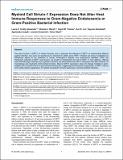Myeloid Cell Sirtuin-1 Expression Does Not Alter Host Immune Responses to Gram-Negative Endotoxemia or Gram-Positive Bacterial Infection
Author(s)
Crotty Alexander, Laura E.; Marsh, Brenda J.; Timmer, Anjuli M.; Lin, Ann E.; Zainabadi, Kayvan; Czopik, Agnieszka; Nizet, Victor; Guarente, Leonard Pershing; ... Show more Show less
DownloadAlexander-2013-Myeloid Cell Sirtuin.pdf (761.8Kb)
PUBLISHER_CC
Publisher with Creative Commons License
Creative Commons Attribution
Terms of use
Metadata
Show full item recordAbstract
The role of sirtuin-1 (SIRT1) in innate immunity, and in particular the influence of SIRT1 on antimicrobial defense against infection, has yet to be reported but is important to define since SIRT1 inhibitors are being investigated as therapeutic agents in the treatment of cancer, Huntington’s disease, and autoimmune diseases. Given the therapeutic potential of SIRT1 suppression, we sought to characterize the role of SIRT1 in host defense. Utilizing both pharmacologic methods and a genetic knockout, we demonstrate that SIRT1 expression has little influence on macrophage and neutrophil antimicrobial functions. Myeloid SIRT1 expression does not change mortality in gram-negative toxin-induced shock or gram-positive bacteremia, suggesting that therapeutic suppression of SIRT1 may be done safely without suppression of myeloid cell-specific immune responses to severe bacterial infections.
Date issued
2013-12Department
Massachusetts Institute of Technology. Department of BiologyJournal
PLoS ONE
Publisher
Public Library of Science
Citation
Crotty Alexander, Laura E., Brenda J. Marsh, Anjuli M. Timmer, Ann E. Lin, Kayvan Zainabadi, Agnieszka Czopik, Leonard Guarente, and Victor Nizet. “Myeloid Cell Sirtuin-1 Expression Does Not Alter Host Immune Responses to Gram-Negative Endotoxemia or Gram-Positive Bacterial Infection.” Edited by Michael B. Fessler. PLoS ONE 8, no. 12 (December 26, 2013): e84481.
Version: Final published version
ISSN
1932-6203